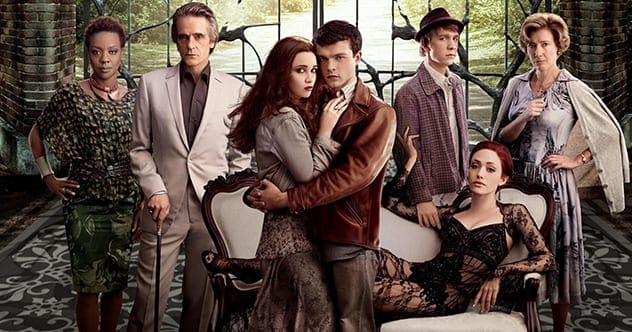It’s common for Hollywood to adapt books into films, hoping to create the next big hit. Series like Lord of the Rings, Harry Potter, Twilight, and The Hunger Games have proven that book adaptations can achieve massive success. Young Adult (YA) novels, in particular, have shown the potential to build dedicated fanbases, making a strong first film crucial for a successful franchise. However, many first installments have flopped, preventing further movies. Let’s explore ten popular YA series that didn’t make it past the first film, often due to bad writing, poor acting, or straying too far from the beloved books.
10 Beautiful Creatures (2013)
Riding the Twilight wave, Kami Garcia and Margaret Stohl’s Caster Chronicles seemed like the next big thing. Similar to Twilight, it features a human romantically involved with a supernatural creature, in this case, a “Caster” who will be claimed by either the Light or Dark by her 16th birthday. One review praised its romance, magic, hauntings, and the promise of more, while Publishers Weekly highlighted its compelling mythology.
Unfortunately, the film underperformed, grossing only $60.1 million on a $60 million budget. Variety Magazine even listed it as one of Hollywood’s biggest box office bombs of 2013. The film fell victim to Hollywood’s attempt to replicate another film’s success rather than celebrating the unique aspects of the Caster Chronicles.
9 Inkheart (2008)
Cornelia Funke, often called the German counterpart to J.K. Rowling, created magical worlds beloved by many. However, the 2008 film adaptation of Inkheart, which sold 3 million copies worldwide, was a disappointment. Barely a financial success, grossing just $62 million on a $60 million budget, the film suffered from the cutting of crucial backstory. While cuts are common in book-to-movie adaptations, the choices made here resulted in a confusing film.
Unlike the magic translated so well in the Harry Potter franchise, Inkheart missed the mark. Rotten Tomatoes described the film as heavy on clichés and light on charm. Cornelia Funke herself expressed disappointment, stating that a book is like a flying carpet, but the movies hand you a napkin and say it’s the same thing.
8 The Mortal Instruments: City of Bones (2013)
In the crowded YA fantasy market, originality is essential. The Mortal Instruments: City of Bones failed to find its unique voice. The Telegraph called it one of the most disastrous page-to-screen adaptations in memory. Critics generally agreed that the film lacked originality.
Rotten Tomatoes noted that it borrows ingredients from seemingly every fantasy franchise of the last 30 years without knowing what to do with them, while The Hollywood Reporter deemed it a shameless, soulless knockoff. Although a sequel never materialized, the series was later adapted into a TV series called Shadowhunters, which premiered in 2016 and ran for three seasons.
7 Cirque de Freak: The Vampire’s Assistant (2009)
One key challenge in making the first film of a franchise is balancing its standalone quality with setting up future installments. Films like Harry Potter and the Philosopher’s Stone and Twilight work as standalone stories, even if sequels were not made. Cirque de Freak: The Vampire’s Assistant failed in this regard by introducing numerous characters solely to set up future films.
The film combined all three books of Darren Shan’s Vampire Blood Trilogy into one movie. Unfortunately, it focussed too much on potential future films rather than the present one. The Hollywood Reporter summarized it perfectly: “One of the film’s biggest burdens is to establish characters and subplots for potential sequels… the trouble is, too many characters must be introduced in the interest of future episodes without having much to do with this one.”
6 Fallen (2016)
The film adaptation of Lauren Kate’s Fallen made every mistake mentioned so far, despite the six-book series having a devoted fanbase. Fallen reached #3 on The New York Times’ Best Seller List of Children’s Books in January 2010 and remained there until April 2011, providing plenty of source material. Yet, it was barely a box office success.
Critics labeled it an eye-rollingly predictable romance and a weaker version of everything that came before it. It also fell into the trap of over-focussing on setting up future films over the content of the present film. Unsurprisingly, no sequel has been confirmed.
5 Eragon (2006)
Box office success doesn’t guarantee a hit franchise, and Eragon proves that. Grossing $250.4 million, it was the 31st highest-grossing film of 2006. However, it was also the 10th worst-reviewed film of the year, according to Rotten Tomatoes. The film faced worldwide criticism across the board, including acting, visuals, writing, and faithfulness to the book.
Reviews labeled it as amateur writing borrowing from Lord of the Rings, describing the world of Eragon as lacking texture or depth. Originally intended as the first of three films, the negative reviews led to the cancellation of the rest of the series.
4 I Am Number Four (2011)
As the first novel of the Lorien Legacies, I Am Number Four reached #1 on the New York Times Best Seller List in Children’s Chapter Books and remained there for seven consecutive weeks. Despite the seven-book series having a loyal following, the sci-fi film adaptation was written off as unoriginal.
Critics cited bland archetypes and listless recycling of elements from countless other YA titles. Although it wasn’t necessarily a box office flop, grossing $150 million on a $50 million budget, any sequel was cancelled due to poor reception.
3 Vampire Academy (2014)
Vampire Academy proves that merely adding vampires to a film doesn’t guarantee success. With a $30 million budget, the film only grossed $15.4 million. Rolling Stone brutally commented that the film needs a stake in the heart. While many adaptations on this list include supernatural creatures, many, including this one, lack originality.
It’s easy for critics and viewers to spot similarities or replications of successful series, which never guarantees success. The beauty of series like Harry Potter and Twilight is that they were the first of their kind in a generation. The film adaptation only has a 16% rating on Rotten Tomatoes, with critics noting that it borrows lazily from its predecessors and offers few laughs or thrills to complement its overstuffed backstory.
2 City of Ember (2008)
The biggest financial flop on this list, City of Ember, had a budget of $55 million and only grossed $17.9 million. Saoirse Ronan’s performance in the lead role was the film’s saving grace. Critics praised the young actress but found little else to compliment.
Reviews of the film highlighted how much it lacked the excitement of Jeanne DuPrau’s series. While the book was described as having full-blooded characters as good as the plot, the film was labeled a simple-minded exercise in juvenile dystopia that had been shredded in the editing room.
1 The Golden Compass (2007)
The top spot belongs to the 2007 film adaptation of Phillip Pullman’s Northern Lights, The Golden Compass. Pullman’s series tackles themes of religion and control in a world overpowered by The Magisterium. Despite some critical debate regarding Pullman’s criticism of Christianity, figures like Rowan Williams supported the novel.
The film diluted and redirected the powerful themes away from any religious connotations. It was a heavily edited-down version that removed the very purpose and soul of Pullman’s books. Despite moving away from the religious criticism, the Catholic League still called for a boycott. The film was not successful, and star Sam Elliot blamed the discontinued trilogy on censorship and the Catholic Church. Fortunately, Pullman’s trilogy found success with the His Dark Materials TV series, released in 2019, which remains more loyal to the books.
What do you think about these book-to-movie adaptations? Leave your comment below!










